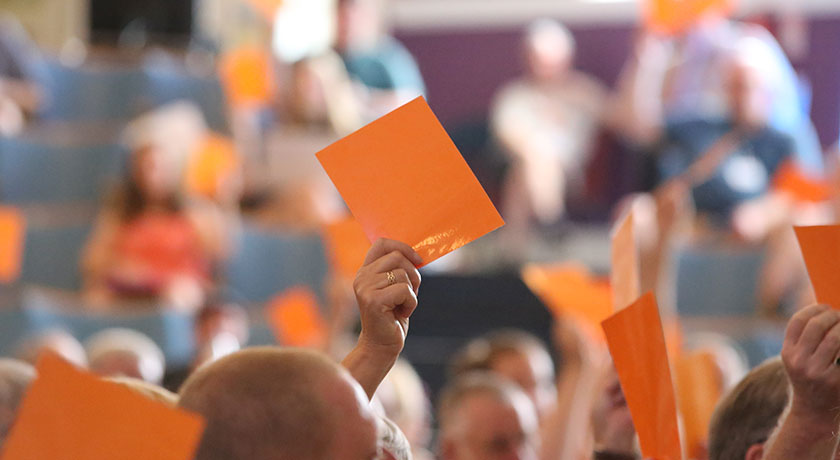 The autumn meeting of the United Reformed Church’s Mission Council opened at The Hayes Conference Centre, in Swanwick, Derbyshire, on 16 November 2018.
The autumn meeting of the United Reformed Church’s Mission Council opened at The Hayes Conference Centre, in Swanwick, Derbyshire, on 16 November 2018.
It began with worship led by the Revd David Coaker, Chaplain to Mr Derek Estill, Moderator of the General Assembly. The Revd Susan Durber led the first of three Bible studies from Philippians, this one about cultivating the virtue of joy, despite our circumstances, as Paul did in this letter from prison.
Day one
Session one:
Paper B1: Executive summary of children’s and youth work committee report, Paper B2: Children’s and youth work review report 2018, Paper B3: Children’s and youth work committee outline strategy
The Revd Jenny Mills, Convenor of the children’s and youth work committee (CYWC), and Dr Sam Richards, the Head of the URC children’s and youth work department, presented papers B1-B3. The aim of the review was to enable local churches, and the URC as a whole, to improve engagement with children and young people in meaningful ways. The review was conducted by a core group of four over eight months.
The group explored all aspects of the Church’s current involvement with children and young people. For example, the Church’s involvement with schools, further and higher education; local churches; synods; children youth development workers (CYDOs), input into available resources, and also spoke directly with children and young people themselves.
Ms Mills said: ‘I’m proud that such a good document has been produced in such a short space of time, led by Sam who has been in post for as long as the review has been going. This report looks to offer not a range of events but a resourcing of the URC. I offer the report to Mission Council with joy.’
Dr Richards went onto present the CYWC’s outline strategy which detailed the vision for the next five years of children’s and youth work in the URC.
The strategy aims to reunite all the parts of children’s and youth work using several methods including an integrated diary of events and connecting with other areas of the URC, such as the Joint Public Issues Team, Church Related Community Work, and the Free Churches Group to impact positively the lives of children and young people. It also aims to initiate deliberate culture change thorough Walking the Way, Stepwise, and resources like the prayer handbook. It also aims to: place a focus on churches where no children and young people are present; reshape Pilots and the CYDO programme; develop an accessible go-to resource bank with links to URC people and develop communication by reinvesting in face2face.
They then took it in turns to present the resolutions and answer questions from the floor.
Dr Richards added there were five key areas where work with children and young people could be strengthened. She named these as faith, community, identity, engagement and growth. Adding: ‘We need to encourage churches to risk some change and be creative … We already have the glowing embers, we just need to rekindle them.’
Mission Council was asked to reaffirm its longstanding commitment to enable children and young people to play their part in the mission of God; direct the children’s and youth work committee to strengthen and support local congregations in their engagement with children and young people through the proposed strategy; encourage all synods to play an active part in developing and delivering Assembly-level resources; authorise the CYWC to develop a fresh expression of Pilots.
There was further discussion around the wording for resolution five, around Mission Council reaffirming its commitment to the current level of resourcing and staffing for children’s and youth work.
A lively discussion was then held, with amendments made to resolution 1 and four.
The resolutions were then passed except for resolution five which was withdrawn.
Session two:
Paper H1: Ministries - explaining possible variations in operating a call to procedure
The Revd Paul Whittle presented Paper H1 which was based on a General Assembly request for the ministries committee to offer examples on the implementation of resolution 28, about how the call process could be exercised in a changing context.
Its paper to Mission Council reminded the meeting that the church exists in a fast-changing society and that the process of issuing a call aims to provide flexible and appropriate ministry, and that responsibilities change during the course of most ministries.
The exploration into the process wasn’t going to undermine the relationship between pastorates and synods but looked at how the Church can do things differently with a more missional focus.
The eight examples offered included:
- A group of three churches scoped at 75% having the synod add the remaining 25% as a scoped post as a transitional minister
- A group of four churches calling two ministers, using them according to their gifts
- A group of four churches becoming accredited as a Church Related Community Worker (CRCW) project, calling a CRCW on a shared basis
- A group of six churches calling two ministers, allowing them to work together with clearly defined pastoral roles
- A group of eight churches calling two ministers with specific churches assigned to each
- A group of 12 churches calling three ministers to a team ministry, with each church identifying a ‘primary’ minister, but with a sharing of particular gifts and specialisations
- A group of 14 churches calling two ministers along with four local leaders and two retired ministers willing to help, along with a Non-Stipendiary Minister (NSM) giving ten hours a week.
Mission Council received the report.
Session three:
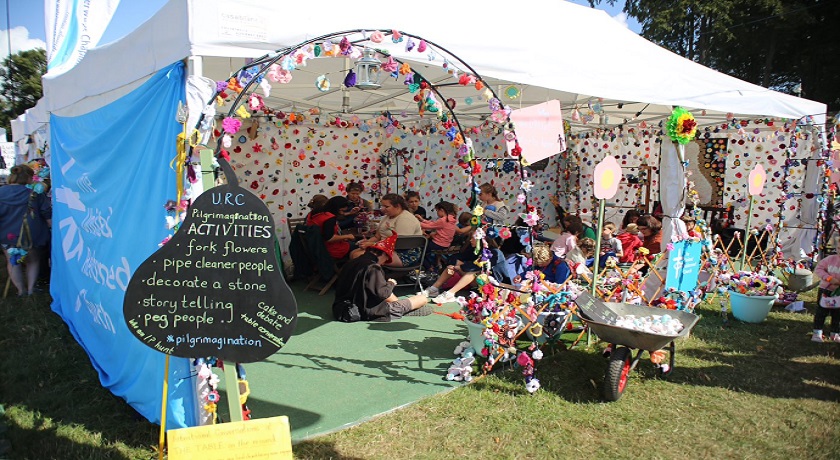 Paper U1: Greenbelt festival
Paper U1: Greenbelt festival
Mission Council advisory group
On Friday evening, Alan Yates, immediate past Moderator of General Assembly, presented a report on the future of the associate partnership between the United Reformed Church and Greenbelt festival. The report was produced for the Mission Council advisory group.
The URC/Greenbelt partnership was originally funded, from 2016 to 2017, by a one-off grant from the Legacy Fund; then, in 2018, a lower level of association was financed from various sources approached by the URC’s Greenbelt planning team – ‘money found down the back of the settee’, as Mr Yates put it.
This year, Mr Yates and the Revd Anne Sardeson produced a review of the partnership. One finding which Mr Yates particularly highlighted for Mission Council was that it appeared that 30% of the 12,000 non-URC visitors at Greenbelt were more aware of URC since attending the festival and saw the denomination in a good light as a result. Another key finding, he said, was that 50% of URC members at Greenbelt said the partnership had a positive impact on local churches.
The three resolutions attached to paper U1 propose that the partnership continue from 2019 to 2021, returning to a higher level of funding, financed from a sum included in the budget for inter-committee projects, and overseen by the mission committee on behalf of the Church. All three resolutions were passed by consensus.
Day two
Mission Council opened with worship led by the Revd Elaine Colechin, Chaplain to the Revd Nigel Uden, Moderator of the General Assembly. The Revd Dr Susan Durber led the second of three Bible studies from Philippians, about cultivating the virtue of humility, imitating Christ’s self-emptying grace and seeing oneself made in the image of God.
Session four:
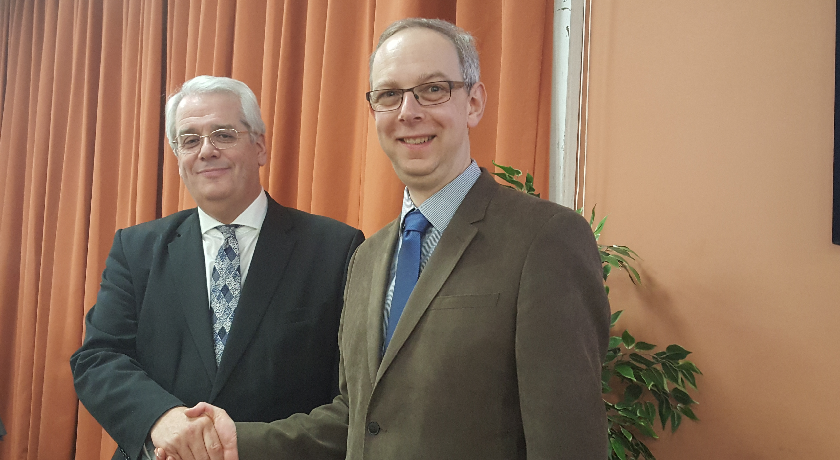 The Revd David Salsbury was welcomed into the role of Stepwise Programme Manager by the Revd Nigel Uden who thanked Mr Salsbury for ‘hearing the call’.
The Revd David Salsbury was welcomed into the role of Stepwise Programme Manager by the Revd Nigel Uden who thanked Mr Salsbury for ‘hearing the call’.
Paper R1-R3: United Reformed Church Past Case Review – Findings and recommendations of the learning group
The Revd Richard Church, Deputy General Secretary (Discipleship) of the URC, and Mr Ioannis Athanasiou, URC Safeguarding Adviser, presented three reports to the Mission Council to encourage and improve the safeguarding ethos in the URC, and to advance its culture of safeguarding.
The main report offered the key learnings and main themes that came up as a result of the Past Case Review (PCR) Learning Group report. The other addressed vetting, disclosure and barring (DBS) checks with clearer guidance for local churches on safer recruitment checks.
Mission Council expressed its heartful gratitude to those who approached the United Reformed Church to voice and share their experiences and stories as part of the PCR.
The report stated that safeguarding is a responsibility for everyone in every congregation, synod, institution and office of the United Reformed Church.
The Safeguarding Advisory Group (SAG) was tasked to take the PCR Learning Group report's recommendations and implement them through a comprehensive strategic safeguarding plan from 2019 to 2024.
Mr Athanasiou reminded the council about the significant work that had already been undertaken along with the ongoing commitment of synod safeguarding leads and church safeguarding coordinators. Work with committees, trustee bodies, reference groups and local ecumenical partnerships would continue to further improve safeguarding policies and practices.
The SAG identified six broad areas for consideration in taking forward a safeguarding strategic plan for the next five years: pastoral care and support, to ensure a lasting, healing process; a safeguarding culture, recognising that safeguarding is at the heart of the church; training, to ensure that ministers, staff and volunteers have the right safeguarding training and skills; policy and governance, to get the right foundations; recording systems, to protect the rights of individuals; and ecumenical and other partnerships.
Ioannis Athanasiou said: ‘Safeguarding is a journey. We have to go on it together at all levels of URC.’
Subject to a factual correction being made, report R1 was received.
Session five:
Paper T1: MIND (ministerial incapacity and disciple advisory group)
This paper was taken out of en bloc and introduced by the Revd John Proctor, General Secretary. The Revd Jacky Embrey had asked to speak about it. Ms Embrey said she was pleased with the direction of travel the group was taking in addressing concerns about the ministerial disciplinary process – known as ‘Section O’. In noting the concerns, MIND is considering whether to initiate changes to the process or to produce a new process. Ms Embrey suggested that a new process, rather than a revised process, would be more suitable. Members of Mission Council, when asked for an informal expression of opinion, were warm to this.
Paper H2: Non-stipendiary ministry of Word and Sacraments
Mission Council authorised a fourth model of non-stipendiary ministry. This followed the work of a group which looked at non-stipendiary ministry and made recommendations about how this form of ministry could be better supported and used.
At a previous Mission Council the ministries committee was requested to develop a fourth model of non-stipendiary ministry, based in a local church or mission project, whose training is locally focussed to meet the needs of the congregation and community. General Assembly ran out of time to discuss the matter and remitted it to Mission Council. This new model was developed so it would complement existing models.
The committee felt that the fourth model was needed to add to the current range of varied and flexible ministry. The new model would be determined in the same way as other calls to ministry of word and sacraments through the synod candidating process and the Assembly’s assessment conference.
Each synod would determine the boundaries of model four NSM according to the needs in planning for mission.
In presenting the resolutions, the Revd Paul Whittle, Convenor of the ministries committee convenor, said that the new model would add missional value to the life of the URC as it sought to build God’s kingdom, without losing what the URC already enjoys with existing models of non-stipendiary ministry. Instead, it would offer even more possibilities of providing what’s needed, sitting alongside the ministry of elders.
As part of a detailed debate, the Revd Simon Walkling, moderator of the URC National Synod of Wales, agreed with members from the South Western Synod by saying that are places where this model of ministry would be useful and warmly welcomed.
Resolution one was passed recognising some disagreement. Resolutions two, three and four were passed by consensus.
Session seven:
En bloc business
The following resolutions were passed en bloc on Saturday afternoon. En bloc resolutions are voted on without debate, having been deemed uncontroversial. This has no reflection on their importance.
I1: Mission committee update
A report on the recent work of the committee, including Commitment for Life partnership agreement.
J1: Nominations
Amendments to the nominations list agreed by General Assembly in July.
L1: URC Trust: Windermere and Church House
An update on developments concerning the two buildings.
M3 and U2: The General Secretariat
A timeline for recruitment following the retirement of the General Secretary and Deputy General Secretary (Discipleship) in 2020, and a proposal to lift two-term cap on the tenure of the General Secretary.
M4: Record of an Assembly commission
A report of an appeal to the General Assembly against a decision of the ministries committee.
N1: Task group on General Assembly
Notice that no report will be made until made until Mission Council of May 2019.
O1 and O2: Human resources advisory group
A report on the recent work of the group, and a revision to its terms of reference.
P1: Marriage in Jersey
Bringing rules for the marriage of same-sex couples in Jersey into line with those elsewhere in the United Reformed Church, following the change in Jersey law.
Z1: Church House management group
Changes to the group’s terms of reference, including end of service dates for members.
Paper J2: Nominations
A report of changes to the nominations list since July 2018 was presented to Mission Council, which was asked to note and approve changes listed in section A – including the addition of Alan Yates who will serve as Chair of the education and learning finance committee until 30 June 2019 – and appoint according to the list of nominations in section B. Both resolutions were passed by consensus.
Paper G2: URC ministers’ retirement costs – making best use of our shared financial resources
On Saturday afternoon, a proposal to encourage synod-based financial contributions to the URC ministers’ pension fund was passed by the Mission Council.
Several synods already give financial support to the pension fund by setting aside a percentage of the sale proceeds of redundant (non-manse) buildings. The proposal encouraged other synods to consider giving 10% of the net proceeds of sales of similar properties so the church could meet the required contributions to the pension fund.
The finance committee also encouraged synods to accept that this form of giving should have priority over similar giving by synods to other central URC bodies.
Paper G1: Budget 2019
The budget for 2019 was passed. Ian Hardie, Treasurer for the URC, reported that the income and expenditure would both be in the region of £20.1m. The ministry and mission giving for 2019 is forecast to be around 1.6% lower than the 2018 budget figure, but overall expenditure is expected to be marginally less than this year largely as a result of a reduction in the costs of ministry.
Looking ahead, the position for 2020 is ‘reasonably satisfactory’ at this stage, despite a projected deficit. Ministry and mission giving is expected to further reduce, and there will be some additional costs in 2021.
Paper A1: Arrangements for General Assembly 2020
The General Secretary, the Revd John Proctor, and the convenor of the Assembly arrangements committee, the Revd James Breslin, presented paper A1 on Friday, dealing with a recent complication to the arrangements for General Assembly 2020.
Assembly’s decision to hold the 2020 Assembly at Aston University, Birmingham, from 10 to 13 July, was based on a quotation which the University is now unable to fulfil. The University can accommodate half of Assembly’s members on that date, or all of them at the end of July. Mission Council was therefore asked to choose between three options, acknowledging that none was ideal:
- Accommodate almost half of the members in hotels three miles from the venue;
- Move the date of Assembly to 31 July till 3 August; or
- Look for an alternative venue on the original date.
Answering questions for clarification, Mr Breslin said that the University has undertaken to provide a shuttle service, but it would have to go through the centre of Birmingham. Work in the city centre on the HS2 train line is due to be complete by then, but this cannot be guaranteed. Mr Proctor said that initial enquiries suggested it was getting late for finding an alternative venue.
When Mission Council debated the question on Saturday, a fourth option was also considered: the Hayes Conference Centre in Swanwick would be available from 6 July, but this would be a midweek Assembly.
Members of Mission Council expressed concerns, personal and in principle, with the various options. Option (b) would be in school holidays and (d) would be bad timing for URC Youth. Option (a) emerged as the most workable. Mr Proctor pointed out that most of the shuttle journeys involved would be at night and or the weekend; only Monday morning’s was likely to be delayed and Assembly would work around that.
Consensus was reached that the committee should pursue option (a) but also try to book accommodation closer to the venue.
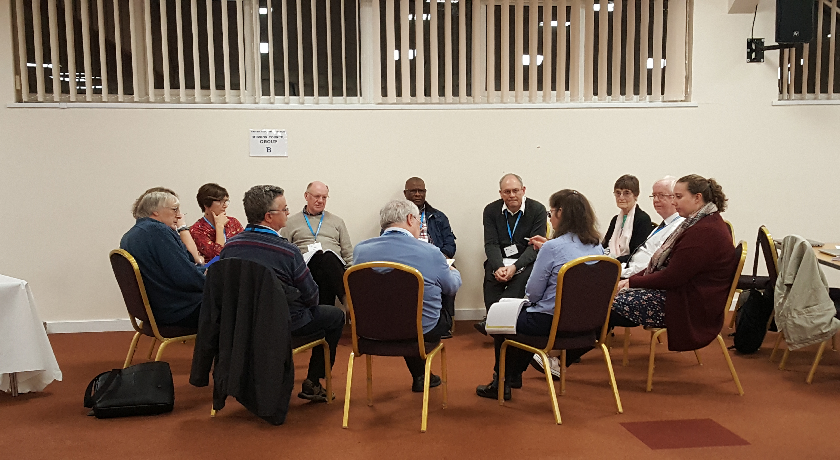 Paper D1: Education and learning: Honouring the Windermere Centre’s legacy through the discipleship development strategy
Paper D1: Education and learning: Honouring the Windermere Centre’s legacy through the discipleship development strategy
The Revd Professor Neil Messer, Convenor of the education and learning committee, presented paper D1 and explained that, at this point, Mission Council was not being asked to make a decision. Instead, it was being asked for feedback, and a steer in the right direction, on proposals about what to do with the proceeds of the sale of the Windermere Centre – which will be decided upon in 2019. Professor Messer advised, that in order for the committee to suggest proposals, it would be helpful for Mission Council to break into discussion groups to answer questions on the three main options presented in the paper: spending interest only, spending a combination of interest and capital, spending capital only. And to explore other ways of the using the funds.
Session eight:
Paper M2: Acting with strategic intent – back office/front office, what next?
Alan Yates, Immediate-past Moderator of General Assembly, introduced a discussion about changing the priorities and focus of the denomination’s work. Recapping on his presentation to Mission Council 2018, he said that the United Reformed Church faces an urgent need for change – it is not on a ‘burning platform’ yet but needs to make profound changes now before they become too urgent ‘and the only option will be drastic surgery’.
Suggesting we need to think about our existing work in terms of ‘front office’ and ‘back office’, Mr Yates explained that front office work focusses on dealing directly with – and delighting – customers; back office work focusses on providing exactly what front office need in order to do that (no more and no less). The denomination’s immediate customers are church leaders, whose customers are their congregations, whose customers are their communities.
The aim of this change in priorities is to keep our focus on the needs of local church.
The goal is to reduce the administrative burden on congregations and synods and to release more resources for them.
The strategy is to identify the 20% of processes that cause 80% of burden; to combine 14 trusts into one and invest, say, 5% of liquid assets a year in people. ‘We are a rich church which behaves as if we are poor,’ said Mr Yates, challenging Mission Council to change that behaviour.
The outcome envisaged is that back office processes become more centralised, so that there will be more resource and energy for the Church’s mission.
Mr Yates suggested that the first step towards this change in priorities is to establish a task group of twelve people, drawn from synod moderators, Assembly moderators, trusts, local churches and the General Secretariat. He invited Mission Council members to discuss these proposals.
Day three
Opening worship
Worship on the final morning of Mission Council began with worship led by the Revd Elaine Colechin, Chaplain to Nigel Uden, Moderator of the General Assembly. The Revd Susan Durber led the third Bible study from Philippians, about cultivating the virtue – or receiving the gift – of perseverance, as Paul urged on the church facing dispiriting difficulties in Philippi.
Session nine:
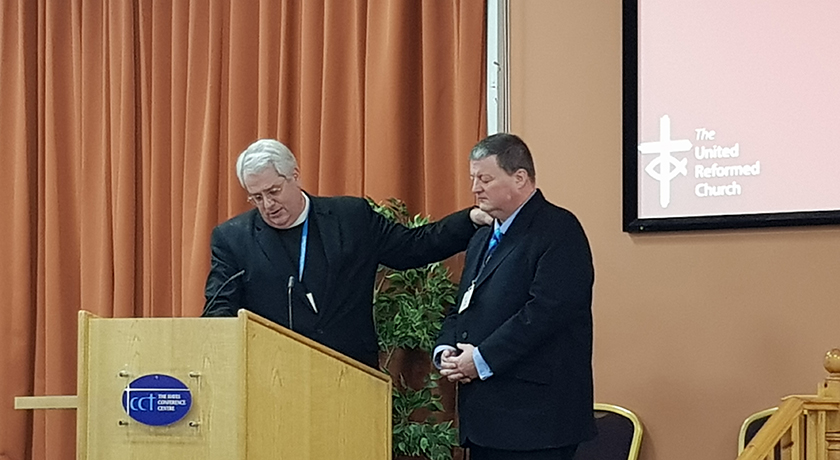 Commissioning head of communications
Commissioning head of communications
On Sunday morning, Andy Jackson, an ordained United Reformed Church elder and past Fury chair of 1994-95, was commissioned as Head of Communications for the URC. Introducing Andy to Mission Council, the Revd Nigel Uden, Assembly Moderator, underlined the importance of communication at the heart of the Church’s role in the world.
The other Assembly Moderator, Derek Estill, led Mission Council in the statement of the nature, faith and order of the URC. Mr Jackson affirmed his faith and commitment, and Mission Council made promises of support. Mr Uden led Mission Council in prayer for Mr Jackson.
Andy was warmly applauded by Mission Council and formally welcomed to his role by Jane Baird, Deputy General Secretary for Admin and Resources, Peter Knowles, convenor of the communications committee, Ann-Marie Abbasah, communications officer, and Derek Estill, Moderator of General Assembly.
Session ten:
Paper R2: Learning from the Past Case Review
The resolution from Paper R2, which thanked those who had contributed to the past case review and the authors of the learning group report, and instructing the safeguarding advisory group to implement the report’s recommendations, was passed.
Paper R3: Vetting, disclosure and barring checks
The resolutions from Paper R3 were also passed, with the agreement that the table of roles within the church that are eligible for a criminal record check, would always need to be revised and updated.
The first resolution affirmed the church’s commitment to guarding the safety of all who are involved with its life and work and to follow current best practice in safeguarding.
The second resolution approved the principles set out in the paper for shaping a new code of practice around vetting, disclosure and barring checks (known as DBS/PVG checks) and safer recruitment procedures.
The third resolution directed the safeguarding advisory group to advocate the principles and practices across the church, and to share these in the next edition of Good Practice.
The safeguarding advisory group also proposed that external contractor Due Diligence Checking Ltd (DDC), which already provides a criminal record checking service for the URC, takes over the checks of all paid and voluntary roles and positions.
DDC has set up a page on its website containing further information and guidance for local churches, trustees, verifiers and other staff responsible for completing online and paper DBS and PVG applications.
Paper I2: Walking the Way: Living the life of Jesus today – Entering a new phase
Francis Brienen, Deputy General Secretary (Mission) presented an update and three draft resolutions on the URC’s focus on lifelong Christian missional discipleship – Walking the Way: Living the life of Jesus today. Ms Brienen advised that it has been well received across the URC and synods are responding in some way to the call of equipping people to recognise and respond to God’s call in everyday life.
She explained that in north Wales, 40 people gather in ‘home’ groups working, eating and playing as encouraged by Andrew Roberts’ book Holy Habits. In another part of the country, someone who is ‘hanging onto the church by her fingertips’ has organised a book group. They are reading and enjoying Holy Habits. In another synod, a group is being creative to take things even further. ‘We are seeing growth in practical and encouraging ways,’ she said.
Ms Brienen went onto explain that the first phase of Walking the Way sought to spread the message in practical ways and through resourcing. For example, by the distribution of an introductory leaflet, prayer cords, the URC Daily Devotions, and the promotion of the book Holy Habits and accompanying booklets – including a series of URC-specific videos on each of the ten habits, and the online resource map on the Walking the Way web pages. But for 2019, the focus will be less on sharing the message and resourcing, and more about building on existing work going on across the URC.
She added that the steering group is working with the London Institute for Contemporary Christianity (LICC) to pilot an accompaniment programme for local churches in two synods.
She also highlighted that funding, from the Council for World Mission (CWM), for Walking the Way will stop after 2020. ‘How we sustain and maintain lifelong and whole life discipleship are the key questions,’ she added. ‘Not only to sustain it but ensure that it stays the main focus.’
The resolutions passed by consensus.
M1: Listening in the URC: A discussion starter
The Revd Nigel Uden, Moderator of General Assembly, presented paper M1 at midday on Saturday, proposing a listening project throughout the United Reformed Church. Taking inspiration from the Zulu community listening process Indaba, Mr Uden spoke of the value of making time and space ‘to listen to one another and to God in one another’.
Members of Mission Council discussed the proposed project in groups and gave notes to Mr Uden. Responding to these comments on Sunday afternoon, Mr Uden said that they had made a number of things clear:
- Listening matters;
- Anything taking the form of an initiative is not desirable;
- The most important place for listening is in the local context. ‘We do not exist to do things for the local without being aware that we are each ourselves the local, or without speaking to the local’;
- We need to listen to both younger and older.
Mr Uden concluded that there is work for the Assembly Moderators to do together with Alan Yates, immediate past Moderator, and he undertook to report back to Mission Council.
Reporting by: Steve Tomkins, Editor of Reform magazine; Ann-Marie Abbasah, Communications Officer; Andy Jackson, Head of Communications




